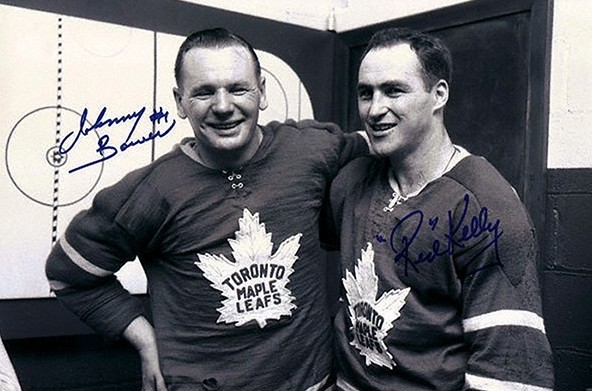

Johnny Bower, born John William Kiszkan on November 8, 1924, in Prince Albert, Saskatchewan, was more than just a Hall of Fame goaltender; he was a symbol of perseverance, heart, and unwavering dedication. His journey to NHL stardom was far from conventional, marked by years in the minor leagues and a late arrival to the big stage. Despite the odds, Bower etched his name into hockey lore, particularly with the Toronto Maple Leafs, where he backstopped the team to four Stanley Cups in the 1960s.
Bower's early life was one of humble beginnings. Growing up as the only boy in a family of nine children, he honed his skills with makeshift equipment, using old mattresses for pads and pucks fashioned from horse manure. At the young age of 15, he lied about his age to enlist in the Canadian Army during World War II, serving for four years. This early display of courage and commitment would become a hallmark of his hockey career.
After his service, Bower pursued his passion for hockey, playing in the American Hockey League (AHL) for 13 seasons before finally getting his chance in the NHL. He dominated the AHL, winning three consecutive Les Cunningham Awards as the league's most valuable player from 1956 to 1958. His stellar play earned him the nickname "The China Wall", a testament to his impenetrable presence in the net.
At the age of 29, Bower made his NHL debut with the New York Rangers in 1953. However, he was soon back in the minor leagues before being acquired by the Toronto Maple Leafs. It was in Toronto where he would achieve his greatest success. Joining the Leafs at 33, Bower defied conventional wisdom about a goaltender's prime. He quickly became the backbone of the team, leading them to three consecutive Stanley Cups from 1962 to 1964.
Bower's impact extended beyond his on-ice performance. He was known for his scrappy style, legendary poke check, and fearless approach to the game. Playing in an era before masks became commonplace, Bower endured countless injuries, further solidifying his reputation as a tough and courageous player.
Even as the Leafs were considered an aging team, with several players over 35, Bower, at 42, and Terry Sawchuk, at 35, led the team to another Stanley Cup victory in 1967. This win was particularly special, marking the Leafs' most recent championship and solidifying Bower's legacy as a clutch performer.
Bower retired at the age of 45 after playing one game in the 1969-70 season. His contributions to the sport were recognized with his induction into the Hockey Hall of Fame in 1976. The Maple Leafs retired his number 1, and a statue of Bower was erected on Legends Row outside the Air Canada Centre.
Post-retirement, Bower remained actively involved with the Maple Leafs organization, serving as a scout, coach, and goodwill ambassador. He dedicated himself to charitable activities and public appearances, always making time for fans and those in need. The Johnny Bower Foundation was established to continue his legacy of supporting charities across Canada.
Johnny Bower passed away on December 26, 2017, at the age of 93, leaving behind a legacy of excellence, sportsmanship, and community service. He was remembered not only for his achievements on the ice but also for his humility, kindness, and genuine appreciation for others. He was inducted into numerous halls of fame, including the AHL Hall of Fame and Canada's Sports Hall of Fame. Johnny Bower's life serves as an inspiration, demonstrating that with hard work, determination, and a generous spirit, anything is possible.